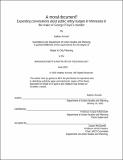A moral document? Expanding conversations about public safety budgets in Minnesota in the wake of George Floyd’s murder
Author(s)
Arnosti, Nathan
DownloadThesis PDF (7.548Mb)
Advisor
McDowell, Ceasar
Terms of use
Metadata
Show full item recordAbstract
Minneapolis, Minnesota, became the epicenter of mass protests for racial justice in 2020 following the police killing of George Floyd on May 25. In the months since, local activists and elected officials have advanced ambitious visions for how the city can reimagine its systems of public safety.
This thesis builds on these perspectives by looking at public safety budgets, specifically, across the state of Minnesota. I make a case for expanding and refining current conversations about public safety budgets in several ways. First, I see existing conversations in Minnesota – centered around reimagining police budgets in major cities like Minneapolis and Saint Paul – as insufficiently narrow. I contend that police departments belong to a broader system of public safety services whose role in society needs to be re-examined, including sheriffs, highway patrols, and correctional agencies. Given that the harms associated with existing systems of public safety, including police killings, serious crime, and incarceration are present statewide – as are residents of color, who are most likely to suffer harms from these systems – I argue that conversations to reimagine public safety must also take place in communities across the state (Section I). Second, I explore the availability of existing public safety resources across the state, identifying what can be considered the upper limit of public safety reinvestment for communities in a first-of-its-kind analysis (Section II). Third, I find that current conversations around public safety budgets are complicated by the different visions, tactics, and roles that community leaders take on, and suggest that conversations around public safety budgets need to be responsive to this variation (Section III). I conclude by identifying questions that can guide further conversations about public safety budgets, examining relevant efforts to reimagine public safety systems in Austin, Los Angeles County, and Oregon, and outlining actions that Minnesotans can take to initiate conversations in their community (Section IV).
Date issued
2021-06Department
Massachusetts Institute of Technology. Department of Urban Studies and PlanningPublisher
Massachusetts Institute of Technology